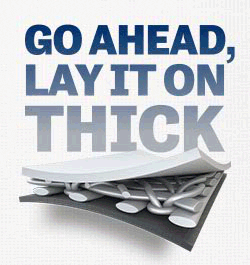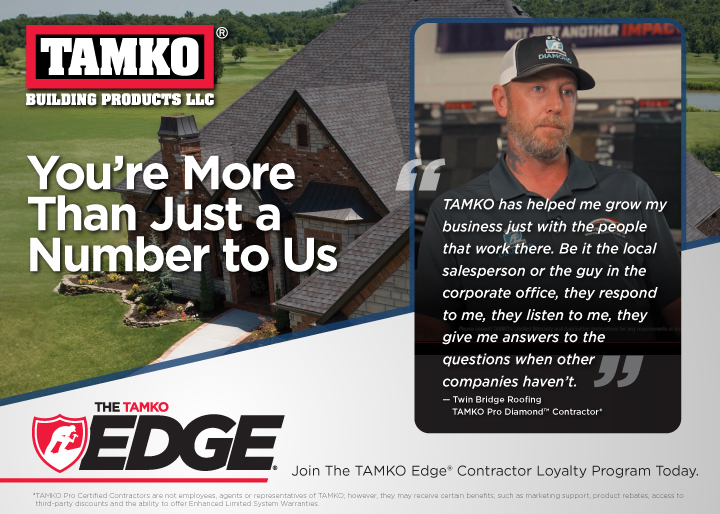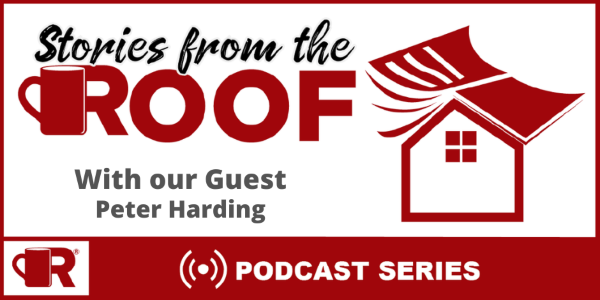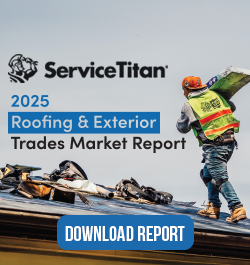John DeRosa - Escape the Price-driven Sale - PODCAST TRANSCRIPTION

Editor's note: The following is the transcript of an live interview with John DeRosa of SRS. You can read the interview below or listen to the podcast.
Speaker 1:
Welcome to Roofing Road Trips with Heidi. Explore the roofing industry through the eyes of a long term professional within the trade. Listen for insights, interviews and exciting news in the roofing industry today.
Heidi Ellsworth:
Hello everyone and welcome to another Roofing Road Trips from RoofersCoffeeShop. My name is Heidi Ellsworth and I am here today with the leading sales expert in roofing, John DaRosa with SRS. Hi John.
John DeRosa:
Oh, you can... Don't say that stuff. That's makes me uncomfortable but thank you.
Heidi Ellsworth:
It's true.
John DeRosa:
Thank you.
Heidi Ellsworth:
How many times did I sit in and watch your webinars when we were at EagleView and I'd sneak in, you were doing your webinars. And I was like, "Yeah, this is good stuff." So we're hoping to share some of that, kind of talk a little bit about how much we both love sales and what you've got going, helping all the SRS contractors because you're doing so much.
John DeRosa:
Yeah, let's do it.
Heidi Ellsworth:
Okay. Well, first of all, for are the very few people out there who may not know you, John. There's very few. Can you introduce yourself? Tell us a little bit about SRS and what you're doing there.
John DeRosa:
Yeah, so I'm John DeRosa, I serve as the Director of Contractor Training and Business Development for SRS Distribution. I joined the company about six years ago and an interesting story, but I approached Dan Tinker who's our president and CEO and I said, "Hey, Dan, I think I want to join distribution and I want to work for SRS." And he didn't really have a position that I was applying for but he saw it as an opportunity and made the, I think very awesome comment. And he said, "Look, if our customers are going to bless us with their business, then it's incumbent upon us to do everything we can to help them be even more successful." So he said, "That's kind of what I want you to do. I want you to help them be successful and I also want you to help our branches provide a better experience to our customers while they do it."
John DeRosa:
So that's kind of what I've been doing for six years. It's a great time I thank SRS for giving the opportunity to dive deeper into this training realm and just love the roofing contractor community and just want to do everything I can for them.
Heidi Ellsworth:
Well, we have that in common. I mean, there's not a better community out there and I love that focus. I think what you and Dan saw, first of all, what a fun job to have, John, I'm jealous. That's a pretty awesome job. And to see what Dan and what all of you are doing for the contractors is really important for them and growing their success. So what have you seen in the last six years with some of the sales trainings, all the different trainings, just kind of that whole thing, what are some of the successes you've seen in the last six years?
John DeRosa:
I think that it's kind of hard to pinpoint the success and then I would love to be able to sit here and lay out the ROI of having me kind of on the payroll. But I do think that we're providing a significant amount of, I'll refer to it as social currency. I think it's just really about us providing an undifferentiated or a highly differentiated solution to the contractors that really speaks 100% to what it is that they want and need to get to an even higher level of success. So the relationships that I've been able to develop and the ability to work with some really successful roofing contractors and help them shore up on some of the weaknesses and really build a process and a system that's designed to help them, not only convert more sales, but do that at higher margins and even increase upselling and things like that. I mean, it's just awesome. So I just see myself as sort of like an add-on to the already strong relationships that our branch personnel have with their customers. So it's been great.
Heidi Ellsworth:
That's great. That's great. So let's talk a little bit about that. The important of training sales people. I know a lot of times people on contractors but everyone, not just contractors, they just start selling, they have a natural affinity for it and they just start selling. They're missing a lot in the house. So what are you doing to help contractors with that sales training to really get them to the next level?
John DeRosa:
Yeah, I'm actually going to almost correct you a little bit, if I may. First of all, I don't think training is the solution and that's kind of ironic because I'm the guy who does training. I did a talk at the IRE this year that was called Stop Training and Start Coaching. And I really have discovered that I think that a lot of the weaknesses that we have on the sales side, with our customers or the fact that we have really entrepreneurial and strong business minded managers and sales managers, but they're not coaching people. And it's like the story that I like to tell is, if anybody's ever had the privilege of teaching their child how to ride a bike, I mean, it's probably one of the most rewarding things as a parent that you can do, right?
John DeRosa:
I mean, it's just something really amazing about that but I didn't sit down with my daughter when I taught her how to ride a bike and say, "Hey, let's watch this PowerPoint presentation." I mean, we went out and we got on a bike and I ran with her and I gave her correction and I coached her and when she fell down, I picked her up, "You're going to be okay, let's try it again. Here's what you did well, here's what you did bad. Let's work on this." And eventually you let go and she's riding the bike by herself and it's like, "Wow, that's really amazing." The training world is the PowerPoint stuff. And yeah, it's important to provide knowledge, but it's critically important that you have somebody on the back end of that knowledge to transfer that into actionable behaviors that literally drive results.
John DeRosa:
And the other thing I just want to say too, is I don't think a lot of our customers when you said they just love to sell and they just get after it, I don't think that's really true. I mean, we have some really good salespeople in our industry, but I think there's a lot of business owners out there that are really good at the craft and the trade and they have amazing skills and they've developed really strong processes, but they hate selling. So one of the things that we try to work on with contractors is to just sort of get their head in the right mindset. And it's one of the biggest weaknesses that I think I've seen and this isn't limited to our industry or my role with SRS. I think it's across the board, is you have people out there that think that are going into sales because they know they have an opportunity to make money, especially in our industry, right?
John DeRosa:
I mean, you can, as a residential roofing salesperson, you can make a really nice living for yourself. But the idea of me being a salesperson, I mean, there's a negative connotation with that, that really nobody wants to aspire to. So what tends to happen is, is what they think really determines how they sell. And if they see selling as a dirty word, if they're afraid, for example, that if I ask for the business, if I ask for the order, that's going to be perceived as pushy. Nobody wants to be seen like that. So what they literally do is they sabotage their own success with this self-limiting belief that says, "I can't ask for the sale because if I do, it's going to make me sound pushy and if I sound pushy, the prospect's not going to like me. And if they don't like me, then I'm going to fail."
John DeRosa:
And it's like, they just don't realize that as long as their values are correct, and this is where we try to set them straight, the question that I ask at every meeting that we have is, "Do you believe that if the customer chooses your company, they're making the best possible decision?" And everybody says, "Yeah." And I go, "And do you honestly believe that in the unlikely event that something goes wrong, that you're going to be there to stand behind the work and you're going to do everything you can to make it right?" And everybody goes, "Yeah." And I go, "Well, if you honestly believe that, then don't you think it's your obligation to put the customer in a position where they can enjoy those benefits?" Because there are others out there like it or not, and we all know that there's others out there that maybe don't believe that the company is the best choice, and they're going to sell the deal.
John DeRosa:
And that just puts a bigger stain on our industry, which is something that we really don't need. And I often joke, right? I mean, even as children, we're scripted to be almost anti sales, right? We're told things like, "Don't talk to strangers." But now we have a job where people are telling us, "Well, go knock on the door of the stranger." Or we're hold things like, "Don't ask too many questions." Well, selling is about asking questions. And my favorite was, I remember as a 10 year old, our neighbors bought a car and we were outside admiring the new car and I was too stupid to know and I was like, "Wow, this is a nice car. How much did it cost?" And I thought if my mother had a wooden spoon in her pocket, holy cow, I would've been a dead man, right?
Heidi Ellsworth:
You never do that.
John DeRosa:
You never ask people about money. Well, now I'm in a sales position where that's exactly what I'm being tasked with doing. So it's like, we need to kind of get that mindset back in check and then make sure that everything is supported by a recipe or a process that facilitates success. That's the key.
Heidi Ellsworth:
You know what? I agree with you because I know in my early days, I did do sales training and not really understanding of it, and I still, to this day, John, to your point, when I'm selling in my back of my mind, kind of in that little thing, "Ask for the close, ask for the close, ask for the sale." And that was something I had to actually learn. So you're right, it's the training up front. I mean, I never even thought of it because being a salesperson in my family was, well, it wasn't a good thing. So I wasn't like the golden child of everything, because they're like, "You're going to sales and marketing? You supposed to be a teacher." But so many people have changed.
Heidi Ellsworth:
So I love that philosophy of, you do need some of the basics, the training, because we didn't all get that and maybe they're getting it more nowadays, but then you just need that coaching to remind yourself. And I love your points about being proud, being willing to talk to straight and ask for the close. I mean, that's a biggie. But a lot of... When we're looking at it too, I think a lot of people have a hard time, they just, even if they are going directly to the close, sometimes they're using price to get there and you have given great talks on things and not selling on price. Where is that falling in today's economy? Because things are a little bit different since COVID.
John DeRosa:
Yeah. So I think that when we talk about prior to jumping into the price thing, one of the things that we try to get people to understand from a closer's mindset, if you will, is to almost not focus on the close, really try to detach from that. And I know it seems like an oxymoron, right? Because the outcome, the close is what we're all there for. But really the more I focus on the customer, the more I focus on what they want, the more I focus on delivering and selling them the experience that they're saying that they wanted, the easier it's going to be for me to get that agreement. And the agreement is based on something that benefits both sides of the relationship and that does translate to the price. I mean, one of the mistakes that we also see is that, and this comes from really a lack of training or maybe a lack of understanding about the process, right?
John DeRosa:
We have customers that will go out and they sort of introduce themselves and they say, "Okay, I'm going to go do a quick inspection. I'm going to come down and I'm going to work up some numbers." And it's like, "Whoa." With that type of approach, with that very limited approach, first of all, you don't have a quality relationship. And second of all, the customer doesn't really know anything about you that would compel them or justify in their mind why they should spend more to do business with you. I've always said that people buy based on differences and it's really based on the perceived value of the differences. So if I have three contractors that are out there, they're all building the same project, we're bidding the same project. And they're basically providing the same message, the same story, making the same claim, "We have the highest quality, we're family owned, we're third generation."
John DeRosa:
Whatever it is, if the customer doesn't perceive there to be any differences, they're going to look for differences because they want to feel like they make a smart decision. And if they don't see any differences, they're going to focus on the price because that price becomes the difference. Now, here's where it gets kind of interesting, the process that I teach and this makes some people little bit uncomfortable, especially if you've got that self-limiting belief that I talked about before, we call it head trash. But the process that I teach is designed to make it about the price. I mean, it's literally designed to create the price objection and it's because when we talk about the process, we talk about four commitments that need to be made in order for that customer to feel comfortable moving forward.
John DeRosa:
The first commitment is a commitment to the need. Do they recognize they have a problem and are they committed to solving it? The second commitment is a commitment to the company. Do they believe that you're a good company and that you're going to provide a great experience and stand behind the work? The third commitment is a commitment to the product. Are they happy with the products that you're using and are they comfortable with all the choices that they've made? Having made those three commitments, it then only comes down to one thing and that's the fourth commitment, and the fourth commitment is the price. Is it affordable? Can you afford us? So literally, when it gets to the point where we are getting ready to ask for the business, and it's a sales technique called a trial close question. We encourage people having secured those first three commitments.
John DeRosa:
Once the customer says to me, after the product commitment question, "Yeah, I'm really happy with the products. I think the roof's going to look great." We would then say, "Well, awesome. Look, usually at this point, our clients tell us, we love your company. We love the product and as long as you can make it fit in our budget, we're going to want to get on this schedule." Is that where we are at? Is that where we stand? And if the client says, "Well, yeah, that's where we're at." Well, then I drop the price and I ask for the business. I mean, it's as simple as that. And if they say they want to think about it, they want to get multiple estimates or even if they say, "Well, the price is really high." That is a huge buying signal. Because what they're telling you is that's the only reason that they would choose to not do business with you because they already told you, "We love your company and we love your product and we want to get the work done."
John DeRosa:
So it really does and I hate to keep oversimplifying this, and I'm not a process oriented guy. I mean, if you knew the way that I live my life, I don't really follow a lot of processes but in sales it's critically important because it does provide a recipe or a roadmap. And then more importantly, on a coaching and a development side, each stage of the process requires a specific set of skills designed to achieve the goal within that stage. So if a rep is struggling to get the agreement or to close the deal, I can then step back into the six steps and figure out where are we breaking down and then focus specifically on that area. So now I'm not focused on the outcome of just go close it or go sell the value. Now I'm focused on, you need to spend more time building rapport. You need to do a better job telling your company story. You need to ask smarter questions. You need to listen better, whatever it is, any one of those elements is going to affect the outcome.
John DeRosa:
So I know I kind of went off on a crazy tangent there, but so the price is all about, at the end of the day, when you follow that process, it's designed to increase the perceived value of doing business with you so much so, that the customer comes to the conclusion that, "I'd have to be crazy to choose anybody other than you." And then in the end, when they say that your price is higher, all you're asking them to do is to measure the perceived value of why they want to do business with you against the additional cost required to obtain that value. "Look, when you add all that into consideration, take all that stuff into consideration Mr. And Mrs. Homeowner, wouldn't you agree we're probably your least expensive option?" I mean, it's really that...
Heidi Ellsworth:
I love it.
John DeRosa:
It's not that simple, but in theory, that's what we're getting at, right?
Heidi Ellsworth:
Yeah. What are you hearing from the contractors as you're going through the six step process and as you're putting that out there, obviously you just did it an IRE and overall, what are some of the response?
John DeRosa:
They love it, the challenge that I have and it's personally offensive to me. When I get into these situations, people say, "I took eight, 10 pages worth of notes." And I'm like, "Great. Let's just pick one thing and let's try to make it happen." Because the thing that I see, and this is where that coaching comes in, is you could provide some really great training and they all node their head and say, "Now, this is really good." But then the winds of circumstance the next day, they're back to the challenges of the day. And a lot of that stuff just kind of falls by the wayside, or the head trash gets in the way.
John DeRosa:
We could talk about overcoming objections and how to ask for the sale. And people look at me and they'll say, "Well, that it's reasonable. That seems like a really... That's an okay question to ask. I think I could ask that." And then when it comes time to ask it, they go, "Oh, I'm not going to ask that." Because they've got that belief in their head. So people love the training. Sales is a really, for lack of a better word, it's a sexy topic. People love it, to be able to get in a room and talk about, geek up about how to close the deal.
Heidi Ellsworth:
Got it.
John DeRosa:
But again, it really requires us to find some actionable steps, the changes that I want to make within myself, focus on those changes one by one and then it's an evolution. I've always said sales success isn't a destination, we're constantly evolving. I'm still evolving today. The thing I try to coach to people on, is that if you approach every single sales outcome, as you get in your car and you're driving away, whether you won the sale or didn't, you need to reflect on that, you need to debrief, how did that go? What did I learn about myself? What did I learn about my prospect? What do I need to change? And then I have to figure out how I can apply that change and put it in actions. So that in the unlikely event that situation avails itself, I'm now better prepared to address it. And like I've always said, right? I'm not the best salesperson on the planet but I pride myself on being very prepared, right? And I think that's what-
Heidi Ellsworth:
Yeah, that's half the battle.
John DeRosa:
... our customers need to be.
Heidi Ellsworth:
Yeah. That's cool. So along with that as I'm being prepared and the changes, I mean, I wouldn't even say changes because some of it is just so tried and true, but what are you seeing from a technology standpoint that kind of helping in these sales processes? I know SRS, it has huge cell technology support. What are you seeing that contractors should kind of be looking at for their sales teams?
John DeRosa:
Well, I thank you for the shameless Roof Hub plug. I mean, it was a very subtle way for you to introduce a subject that is very near and dear to our heart at SRF, our desktop and mobile application, customers love it and it works. But I think the thing that is always interesting for me is I get a lot of contractors that say, "John, I want to scale." And that's like, seems to be an industry buzzword. People are talking about scaling. And one of the things that I try to talk to them about is, is that in the best interest of a customer scaling, they need to figure out how they can free up their time to focus on the areas that require their attention. And you know as well as I do that, we have a lot of customers out there that are entrepreneurial and they're wearing 17 different hats every day.
John DeRosa:
They're trying to jam 36 hours into a eight hour day or a 10 hour day and not only is it like not sustainable and scalable, it's not healthy. And one of the things we talk about is, is leveraging technology for the benefit of streamlining your workflows to the point where the business can almost run without them. And at the same time, it allows for the contractor to provide a very, a very consistent experience across the board. So now I know that all of my salespeople are responding in the same way, in the same timeframe, using the same language, talk with the same talking points. And that's really good from a brand development perspective, but technology-wise, obviously people are using photos and videos to help aid with their inspection. There's some great programs out there that are helping people with presentations and deliver cloud based presentations that provide analytics back to the business owner to let them know like what slides are people showing? What links are they clicking on?
John DeRosa:
I mean, the availability of Roof Hub and the fact that the customers can design templates, import their EagleView reports to assign a waste factor and then determine instantaneously, real time pricing based on a good, better, best upsell package, allows them to very quickly and very professionally and confidently provide a number to the customer that allows them to really improve their opportunities to upsell. I just think we are as an industry, and I think we're getting better. I mean, thanks to you, Heidi, because I know you do a lot to help with your podcasts and RoofersCoffeeShop to get people focused on some of these tools that are out there, but it really does. We do have to try to embrace some of the technology.
John DeRosa:
There was an interesting thing. I don't know, I'm sure some of the listeners are familiar with this, but there was a residential roofing contractor in Florida, very, very successful retail roofing contra... 100% retail, just sold his business to a Fortune 500 company for an undisclosed amount. But I'm sure it was pretty significant. One of the things that he was quoted as saying is that he hadn't touched the day to day in five years. I mean, that's what businesses want to buy. You can be $100 million contractor and you don't touch the day to day. I mean, it's like there's equity in that. So how do you do that? Processes, systems, technology, leverage the tools that are out there. And if any of the listeners want to call me and say, "Hey, John, I can't justify the cost of using AccuLynx or using GiddyUp or using JobProgress, call me, and I'm going to kind of give you a piece of my mind. Because the ROI on that nominal expense, it's tremendous. It's almost hard to not justify.
Heidi Ellsworth:
Well. And you talked about earlier about differentiators, right? That customers are looking for the differences, technology provides that. I mean, when you are sitting there at the kitchen table or wherever or Zoom, whatever it may be and you are able to use the technologies that are out there, I think it is a differentiator. And we've seen that through the last couple years, the contractors who've been able to pivot and be able to continue using technology across the company, are seeing a huge difference and are far and ahead. I mean, I know who you're talking about in Florida and yeah, it's pretty impressive. It's crazy. So as you know, one of the things that I also think is really important as you know I'm pretty committed to, is how are we recruiting more people into the industry? And right now, contractors success, whether that's they need more labor, more salespeople, back office, whatever it may be, what are some of the things you're seeing around that with the recruitment and the labor issues?
John DeRosa:
The labor issues are a challenge. I mean, and I think we can all agree to that. And there's definitely companies out there that have bulletin boards and mobile apps and what are they calling them? Where people can register a profile and put themselves out there. The challenge that we see in that is that it's not creating more labor. It's just taking that small poll of labor that we have and it's now just making it available. So contractors are going into those sites and they're seeing that I'm now looking at the same guys that I've been using for the past 10 years and there's nobody new and I'm already keeping them busy. I think on the recruiting side, and I can really speak better to the sales, the problem that we have on the sales side is that a lot of the business owners out there don't really have a sales training program. They don't have a process that they follow.
John DeRosa:
And what happens is, is they wind up feeling like they're forced to buy or to hire those sort of retreads that just kind of kick around from contractor to contractor to contractor, because they come with the skills to bring some revenue but they're culture killers. I mean, they just don't fit. And I've had conversations with some business owners that like, "Well, I hired this guy or this gal, and I knew they weren't a good fit but I knew they could bring some revenue." And I hate to keep beating the sales process stick but that's the point of the process. You can then hire the people that you want. You can hire the waiter at the restaurant that really impressed you or the kid at the kiosk in the mall who had a great personality and grabbed your attention.
John DeRosa:
And you could say, "Hey, look, I can get you an opportunity to make like drug dealer money. And all you got to do, all you got to do is follow this recipe. Here's the process. Here's the system, here's the scripts and go out and make that happen." And if we can do that, and that's something that I'm committed to trying to help our customers to do, is put those processes in place, build that recipe so that you can build the team you want and not have to try to put a square peg in a round hole by hiring people that aren't really a good fit.
Heidi Ellsworth:
Right. And with how the markets are changing and the millennial homeowners who are looking for roofs, they're looking for people who look like them. They're looking for younger people, they're looking for women, they're looking for minorities. So you don't have to keep going back to that same pool that we've had in roofing for so long. It's now able to... I mean, I've seen with contractors, them hire people from restaurants, from so many different places, if they have the right training in place.
John DeRosa:
Yeah. And I'm glad you brought up the women thing, and I know that I was privileged to be at the National Women and Roofing two years... Or the last August IRE, when it was 2000 degrees. But I was actually on a Zoom call, a consultation call this morning with a customer and he made the comment, and he goes, "I've noticed that the ladies do really well in our industry." And I'm like, "I have been saying it." I mean, if you can ask anybody, we had almost 250 people in DFW this week at a seminar. I mean, I get up on a soapbox about, if you're not hiring women salespeople in our industry, you are A, something's wrong and B, you're selling yourself short. They're are... And I'm not taking anything away because men have skills too but their skills are a little bit different, but women crush it in our industry.
John DeRosa:
So you got to stop thinking that it's, "I got to hire guys, because it's a male dominated industry or a male..." I don't even know what the proper term is. Women kill it, they're great listeners. They're very collaborative, they register very high in the emotional intelligence area, they bond and they develop trust a lot more easily with the client and that's not to be negative on guys. I just think that there's certain skills that women naturally have that I think lend itself well to our industry. And if you're not taking advantage of that, you're selling yourself short because they're going to crush it.
Heidi Ellsworth:
I'm seeing... I mean, when I first went into sales in roofing, there were not very many women in sales. And now I'm seeing it across the board, whether it's some manufacturing, distributing with contractors. And I think one of the things too, and love that emotional intelligence, and you even said it earlier in the podcast about, you have to be able to ask questions. But we are so often at some point in our life told, "You ask too many questions." I love asking questions. Obviously I do a podcast, I love to ask you questions. And I think that is something that is changing and also when we're seeing a lot of young people come in, they're very inquisitive. And so they're not afraid to build that relationship and ask those questions, which is exactly what you were talking about earlier.
John DeRosa:
Yeah. The challenge with the young people, especially in what we see from like a commission based sales role, you're 100% commission and you have the bill to make a significant amount of money, is that some of these young people come into the industry, they do really well but they make enough money where they feel like they only need to work two days a week. Right? I mean, seriously, it's like, "Wow. I worked two days and I'm going to make $60,000 this year and that's pretty darn good, because I just left working at Chick-fil-A and now I made 60 grand." And it's like, "Now I don't want to work the rest of the week."
Heidi Ellsworth:
Right, yeah.
John DeRosa:
So, but again, with the coaching and the training and putting some motivation under them, you do have an opportunity to create some real rainmakers for you.
Heidi Ellsworth:
Yeah. Well, and I've also found that we may have to start thinking different too. Roofing contractors may have to... I mean, as a business owner, I have to think different. I have a lot of part-time people who work for me, some moms with kids, young people who have other gigs. So with this whole labor thing and this next generation, I think it's giving the training coaching, exactly like you said, and then maybe having a little bit of grace that it's not going to be exactly the same as it was for the last couple decades or forever. And so looking at things a little bit different and so that's why I love that you're getting up there and promoting women, the diversity and just bringing all of this in, it's so important and SRS really is a leader in all of that too.
Heidi Ellsworth:
So John, what are some of the... One of the things we're seeing is actually contractors are so busy, right? They're a huge demand, material shortages, so they aren't always getting materials. So it created even this bigger gap. What is some of your advice to contractors to keep their heads above water? I know we just talked about technology, but any other things that you're seeing that are kind of helping contractors navigate what's been happening?
John DeRosa:
I always get a little bit, kind of on a soapbox a little bit when guys tell me that their backlogs are out of control. And I think the reason for that is, is I think you can talk to... There's a couple things happen, right? One, they'll tell us that their backlogs are out of control. Two, they'll tell us that they have too many leads and they can't follow up with them. I mean, we talk about, I think Remodeling Magazine a couple of years ago, did a report called Speed To Lead, where they sent to out lead requests through 100 contractors across the country and they found that 40% of those leads were not even responded to. And I get contractors in meetings that go, "Oh yeah, I can see that happening." It's like, "Well, I don't understand why."
John DeRosa:
And the first thing that I ask, the question that I want to ask is, "Is that an opportunity for us to maybe consider raising our prices a little bit?" I mean, if I have more business than I can possibly manage and I have more leads than I can effectively respond to, then is there something to be said for the fact that maybe I can charge a little bit more? Yeah, I might lose a little bit of my... I might reduce my backlog a little bit but I also have less stress. I'm making a higher margin and then I have the ability to respond to some of those really good leads that we're not able to get to.
John DeRosa:
So that's like the first thing we talk about. I mean, Disney World is notorious for the fact that once admissions start to get to a certain level, they start jacking their prices up. And it has nothing to do with the cost of running the park, it has everything to do with delivering a magical experience of the guest. They realize that as the park gets crowded, people are going to get hot, lines are going to get longer. They're going to start treating the staff differently. The staff's going to start having a difficult time being magical, so what do they do? They raise the prices so that everybody's happy.
John DeRosa:
I mean, it's like it's oxymoron, it's insane. But I think there's lesson to be learned from that and I think that maybe that's one thing to look at going into again, I mean, we're hoping that this year's going to be less severe than it was last year. We still think that there's the potential for some challenges, but I would encourage our contractors to look at their contracts. You've certainly done some great podcasts with some people that talk about escalation clauses and things like that. Let's look at how we can sort of protect ourselves, but do it in a way that still makes it win-win for the customer. I would encourage contractors to be upfront with their distributors on what their expect... Not expectations. I mean, we know what they expect. They want it delivered now and at the right price every time, but I mean, what kind of orders do they have coming in? What do those orders look like? Utilize our... Let us help you build your production schedule based on the inventories that we have coming in. And that's something that we've been successful with a lot of customers out there.
John DeRosa:
And then the other thing too, is just constantly recognize that roofing contractors, it's a margin based business and I know that we don't like it because it's a headache and we're afraid that the guy down the street selling too cheap. But at the end of the day, if your costs go up 10% and you raise your prices 10%, then you are going to get to your year end goal that much quicker. And you're also going to make a higher dollar per sale just based on, even though the margin hasn't really changed. So there are some good news in all that. And I think the buzz that I'm hearing from this, the conversations that I've been having with customers is that they have raised their price. They are starting to see the benefit of that but they're also saying, "Hey, but just stop already."
Heidi Ellsworth:
Yeah. I know. I mean, supply and demand is 100% what we're dealing with, supply and demand. And we all know that that's going to make some changes. And being prepared for those, because it's going to change again, right? We're doing roofing economic outlooks right now with Angie on our site and talking about inflation and all of those different kind of things. Well, that comes right back to affecting the sales and how you're talking to the homeowners. And so let's... Kind of to wrap up this podcast. I would love a little bit of your vision into the rest of the year on and just kind of maybe some of the things. I know you just said a lot of them, watch your contract, everything else. But anything else that contractors should be looking at through 2022 and even into 2023 to kind of incorporate to improving their business?
John DeRosa:
Yeah. I think if I could, it's not going to be an easy answer. But I think it really just comes down to identifying what it is specifically that you want to accomplish. And I know that maybe seem like that might seem like an overly simplistic answer, but I think some of our customers tend to get too wrapped up in, "How do I eat this elephant?" And I think that what you really need to do, is you need to figure out like obviously it's going to be sort of one bite at a time but what is it specifically that I want to accomplish? I mean, I've helped people develop what we call like a two page strategic plan. And this isn't a plan that you would bring into a bank for a loan or anything like that.
John DeRosa:
But it really just identifies, where am I at today and how am I measuring my success? Where do I want to get to tomorrow or in two years, or in three years or in five years? And then what does that look like from a measurement perspective? And there should be a sizeable gap between the current state and the vision state. And then when we begin to do literally on a calendar, as we begin to map out specific actions that are designed to close the gap and we help assign responsibilities of who's going to do that. And what's always amazing is when we finish that process and it's not a long process, it takes maybe an hour, right? When we step back and we take a kind of a look at it, people usually go, "Oh, my gosh, this is... I can do this."
John DeRosa:
And the reality is I have always say like, "Even if you did half of it, are you better off?" And they go, "Yeah." And I go, "Well, let's just go for it and let's make it happen." But then hold yourself accountable to doing the things that you said you were going to do and not allow yourself to sort of be the victim of the market, the customer whatever issues that are out there challenging you. So again, number one, recommendation, let's set a goal, let's figure out the best path to get there. Let's stay focused on the target. And even though the environment around us is changing and there's challenges that it might be making it difficult for you to get from point A to point B, the goal doesn't change. We just change ourselves and our plan relative to getting there. And you might not get there on the day you want it, but if you get there a week late, you still got there.
Heidi Ellsworth:
Yeah. You still get there.
John DeRosa:
That's really the point, yeah. And you're moving forward, right? You feel so much more empowered when you see yourself growing and moving towards something than to just be sitting on our hands and saying, "It's not my fault, it's the economy's fault. It's the vendor's fault. It's the competition's fault, it's the customer's fault." And I know our customers don't do that, but I do see that with salespeople sometimes, but yeah, let's just pick a goal and go after it.
Heidi Ellsworth:
Yeah. And figure out how to get there, whether you're going through, over, around, whatever you have to do, but right now, it's just a matter of finding the right people, finding the right resources and the building the relationships. So let's end this with, how do people get a hold of you?
John DeRosa:
I just want to say one more thing too. Leverage your suppliers as well, right? And I mean, obviously it's self-serving for me to say this about SRS, but we have some great people in our organization that can help and are eager to help our customers succeed. So if you need help with recruiting or onboarding, or how do I be better manager or I'm thinking about acquiring a business and how do I go about doing that? I mean, we have resources within the organization. People that we can put you in touch with that are happy to kind of have that conversation, if for no reason, other than the fact that it takes us out of our day to day and lets us develop a new relationship. So if guys want to get in touch with me, can contact me at jderosa@srsdistribution.com. We also do have a Facebook group called the SRS Sales Academy that I moderate, got a couple thousand members there in a few short months. I'm only putting content on there that are sales focused. We do a weekly live coaching clinic where we about a topic and I'll just drop some information on everybody. I put a lot of content on there, really designed to help the contractor win. And other than that, that's how you get in touch with me. [crosstalk 00:38:33].
Heidi Ellsworth:
I love it. I have to tell you, I love that Facebook group. I'm going to... Well, if I can, I'll request to join. Because I'd love to learn that stuff and watch on. And that is a great way too, because you get notifications. It just kind of keeps it top of mind. What a great idea. That's really awesome.
John DeRosa:
I know the guy that runs it, so I might be able to get you in.
Heidi Ellsworth:
Yeah. Okay, good. Okay. Don't turn me away, John. Well for everybody too, if you need to find John, you need to find out what's going on with SRS, you can find that on the SRS directory in RoofersCoffeeShop. And of course, on the SRS website, which you'll get there through the directory too. So you can find it no matter how you're looking for it. John, thank you so much for being here today. It is always a pleasure.
John DeRosa:
Thank you and thank you for what you're doing. I mean, we love getting your emails and you make it even more fun to be part of the roofing industry. So I appreciate it.
Heidi Ellsworth:
We want to make... We have to have a little fun. We all work really hard. So [crosstalk 00:39:30] well, thank you. And thank you all for listening. I so appreciate you being here and being a part of our podcast. Please you can find our podcast on all the podcast channels, be sure to subscribe and get notifications so you don't miss a single one. You can also find them under the Read, Listen and Watch initiative on RoofersCoffeeShop. So we will see you on the next time on Roofing Road Trips. Have a great day.
Speaker 1:
Make sure to subscribe to our channel and leave a review. Thanks for listening. This has been Roofing Road Trips with Heidi from the rooferscoffeshop.com.






















Comments
Leave a Reply
Have an account? Login to leave a comment!
Sign In